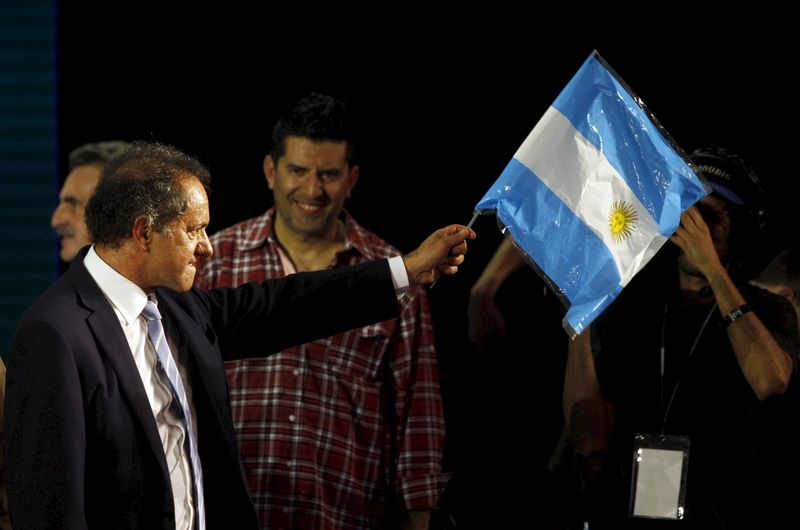By Hugh Bronstein
BUENOS AIRES (Reuters) - Argentina's presidential front-runner wants to settle a financially hobbling suit with bondholders, woo new investors, cut inflation and could revise energy subsidies to put the country's fiscal house in order, his economic advisor said.
Buenos Aires Governor Daniel Scioli may represent the party of outgoing President Cristina Fernandez, whose currency and trade controls have slowed the economy, but his policies may veer away from hers if he wins the October election.
A shift towards orthodoxy could help untangle Argentina's relationship with the global bond market and attract foreign companies eager to exploit the country's natural resources.
Gustavo Marangoni, head of Banco de la Provincia and advisor to Scioli since he started in politics 18 years ago, used words like "flexibility" and "pragmatism" when asked in a Wednesday interview how Scioli's policies might differ from Fernandez's.
He declined to outline direct policy contrasts, but said Scioli would "negotiate in good faith" with New York hedge funds suing in U.S. courts for full repayment of bonds that Argentina defaulted on in 2002.
Fernandez refuses to offer the funds anything other than the terms of Argentina's 2005 and 2010 restructurings, in which 93 percent of holders accepted about 30 cents on the dollar. The legal battle has kept the country in default.
"Daniel's challenge will be to engineer a leap forward in economic development, and that means investment. Daniel is clear about the importance that investment will play in the period ahead," Marangoni said.
Scioli won Sunday's ruling primary elections. Second was Mauricio Macri, the business-friendly mayor of Buenos Aires who bills himself as the only candidate the markets can trust to shape up Argentina's economy.
Needing to appeal to the wider electorate while not alienating Fernandez's left-leaning base, Scioli has been vague about any planned policy changes. Marangoni hinted that Scioli would reform costly nationwide electricity subsidies.
"Look at what we did in the province," he said. "Our policy is one of fairness. Those who need electricity subsidies continue to have them. Those who do not need subsidies had them cut."
Fernandez is barred from running for a third consecutive term in October, but could return as a candidate in 2019.
Analysts say consumer prices are currently rising at close to 30 percent per year. Scioli says he would reduce inflation to single digits by the end of his first four-year term.
Investment has lagged in part because the government limits the amount of profits that foreign companies can send home. Oil companies say this has kept them from investing in Argentina's vast but barely tapped shale oil resources in Patagonia.

"Companies invest in other countries to earn money," Marangoni said. "Our idea is to find the right balance by sitting down and negotiating in a more cordial way to get to solutions by consensus."